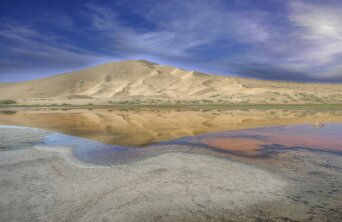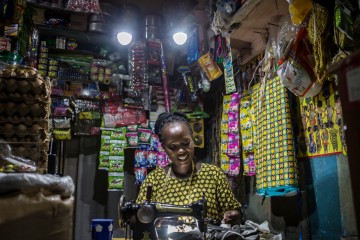- About
- Topics
- Picks
- Audio
- Story
- In-Depth
- Opinion
- News
- Donate
- Signup for our newsletterOur Editors' Best Picks.Send
Read, Debate: Engage.
| topic: | Colonialism |
|---|---|
| located: | Mongolia |
| editor: | Lital Khaikin |
With untapped lithium and uranium deposits in the Gobi Desert, Mongolia is becoming a key source of critical metals for the European clean energy transition.
In October 2023, France and Mongolia set another wave of resource imperialism in Central Asia in motion. French President Emmanuel Macron and Mongolian President Ukhnaagiin Khürelsükh committed 400,000 euros to explore a potentially lithium-rich basin in central Mongolia. Earlier this January, the National Geological Survey of Mongolia (NGS) and the French Geological Survey, BRGM, created a joint initiative called LiMongolia.
Soviet researchers had long identified lithium deposits in Mongolia. Canada, however, was the first country granted a lithium brine exploration license when ION Energy acquired rights in 2017 for two projects in the Sükhbaatar province.
Mongolia serves as an alternative source for lithium sourced from China and other globally dominant producers like Bolivia, Argentina and Chile, as well as emerging African mines.
The South American lithium triangle, holding 56 per cent of the world's lithium reserves, has been edging toward a "lithium OPEC" (Organization of the Petroleum Exporting Countries), as Bolivian President Luis Arce referred to the proposed cartel in March 2023 before being ousted from the Movement toward Socialism party in October.
Mongolia could produce lithium similarly to non-OPEC Central Asian oil producers Kazakhstan and Azerbaijan.
The lithium exploration deal with France occurred in tandem with a 1 billion euro agreement on uranium mining. Prospecting in the Dornogobi province since 1997, the French multinational Orano has the right to exploit the Zuuvch-Ovoo mine in the Gobi Desert, with production expected to start in 2028.
However, the uranium deal faced delays this February, which may extend the finalisation of the agreement until the June Mongolian elections.
France has justified its claim on the Mongolian critical metal supply as necessary for its own "energy sovereignty", even though it is simply shifting dependence from fossil fuel imports primarily from Norway and Russia.
France also scrapped existing renewables targets this winter in a move criticised for giving more priority to nuclear energy, which represented 62 per cent of the country's electricity generation in 2022.
For the past year, Électricité de France (EDF) reported an increase in nuclear power output that brought in a net profit of €10bn. An estimated 46 reactors will be in operation by January 2024, and at least six new reactors are expected to be built.
The uranium deal with Mongolia occurs alongside France's strengthening cooperation with Bulgaria on nuclear development. A declaration signed in February emphasised "the possibilities of cooperation on new construction projects in Bulgaria," including large and small reactors.
France's incursion into critical metals in the Gobi Desert solidifies Mongolia's evolution into a clientelist state for Europe's green energy transition. Fuelling Europe's need for electricity, Mongolia's so-called "wolf economy" shows that resource colonialism has moved the needle on the compass.
Image by Pua Bar

